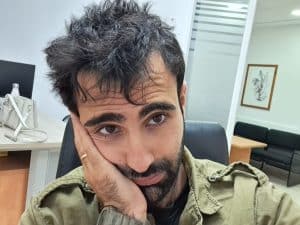I grew up in Baghdad in a wealthy and mixed neighborhood. One of my closest friends was the son of an Arab mother from Lebanon and an arrogant British officer who served as an instructor in the Iraqi Army. The imperial officer forbade his children to speak Arabic – even with their mother. And he absolutely prohibited them from making friends with the children in the neighborhood. Nonetheless, his son Anton, encouraged by his mother, violated the prohibition and the two of us developed a wonderful friendship. The language of the friendship was Arabic, of course. He was a gentle and intelligent boy and avidly drew from the ocean of British literature and culture. He was interested in what we Jews believe. I told him that we are an optimistic people. Always looking toward a promised future, because the messiah is supposed to bring us redemption. Anton was horrified. “It would mean the end of the world,” he cried. “After all, at the end of days, according to our belief, the world will be destroyed and people will die in fire and plague.” I quickly tried to reassure him. The coming of the messiah, I explained, is very far away, because our rabbis have forbidden us from hastening the onset of the messianic era. I don’t know if I convinced him. In any case, his words about the end of days did not frighten me because I grew up in the warmth of a relaxed and self-assured Judaism. The religion was a matter of spirituality and not an abundance of texts, prohibitions and bans. Sasson Kadourie, the chief rabbi of Iraq, sent his sons to a university, not to a yeshiva. Thus, even the religious leadership strove toward modern education rather than a proliferation of rabbis. Even my mother preferred a direct connection to her God, without the mediation of rabbis. I already wrote several decades ago that God was big in Iraq and the rabbis were small. They conducted their lives modestly. Wealthy rebbes and rabbinical courts were foreign to Judaism in Iraq. In Israel, I found that the rabbis are giants and God became tiny. I also found that writers and poets, singers and commentators, journalists and writers for radio and television, kashrut inspectors and leaders of political parties all engage in selling God like a hot item to uneducated people who have lost the ability to think and judge on their own.
God does not play dice, Einstein said. But in Israel I see that devout settlers are conducting a tough poker game with God. Here a dangerous mixture of religion and militant ultra-nationalism is brewing. During the days of the evacuation of the settlements from Gaza, a mother sent her little son into their yard to pray to the Lord above, with an innocent request to cancel the decree. The bulldozers pounced on the homes, and the walls collapsed. Shocked, the boy returned to his mother. He apparently faced a painful dilemma. It is hard to blame the God of the Jews when the rabbis are proclaiming his tremendous powers. It is also hard to blame the loving mother for sending the boy on an impossible mission. Was the mother wrong? Or did God need a more vigorous prodding? The child likely blamed himself. Perhaps the soul of such a defeated child prepares him for becoming one of the hilltop youth who are also willing to also harass Jews, even the soldiers who are protecting them, if only to forgive God for His indifference to the fervent prayers. If the Master of the Universe does not defeat the gentiles, then they will do it themselves.
Empires have disintegrated and disappeared, while Judaism – the religion that sanctifies life in this world – continues to exist. Judaism engendered the boldest social revolution in ancient history. It laid a wonderful foundation for the basic rights of every person. It granted a weekly day of rest, also for maidservants and slaves, and even for beasts. It was able to build bridges to the stranger and the neighbor. My Judaism orders us to enjoy the fruit of life in peace and tranquility, here and now, because tomorrow we all return to the dust. If you don’t build heaven here on earth – no heaven will await you anywhere else.
Sami Michael is an author and president of the Association for Civil Rights in Israel.









